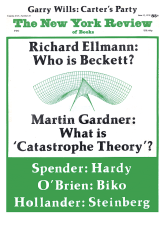In response to:
The Politics of Joyce from the June 9, 1977 issue
To the Editors:
In writing on “The Politics of Joyce” (NYR, June 9, 1977), Richard Ellmann takes occasion to refer to me as having “lamented that Joyce failed in Ulysses to display the evils of modern industrialism as D.H. Lawrence in Women in Love exposed the horrors of the coal mines,” even though, he adds, I do “concede” that it would have been difficult to place coal mines in an Irish setting. Perhaps Professor Ellmann was relying on a vague memory of what I actually wrote about Ulysses, but somehow he has managed to impute to me a collection of views none of which I hold and all of which, he may be glad to know, seem no less ridiculous to me than they do to him.
Firstly let me disclose my lack of interest in all coal mines, Irish or otherwise; about these I have “conceded” nothing since I have nothing to concede. Professor Ellmann’s concern with them is entirely his own. In the second place, I have not “lamented” any such failure as Professor Ellmann describes—partly because I do not believe this is a failure of the book, and partly because one does not lament what is of no importance. What I have argued is rather different: that not only do many of Joyce’s encyclopedic ambitions in Ulysses remain unachieved, but that his understanding of modern society—or rather, that understanding of it realized in Ulysses—is by no means complete and universal in range and implication, as some critics have rashly claimed. (Since I have the deepest suspicion of all total, universalist conceptions of modern society, I find it neither surprising nor regrettable that Ulysses is not what such critics say it is.) I do not think therefore that Ulysses ought to have “displayed” or “exposed” the evils of modern industrialism, much less that this is a reason for using Lawrence as a stick to beat Joyce with. Those are not the terms in which I see the business of criticism; and in any case what has the value of Women in Love to do with “exposing the horrors of the coal mines”? On the contrary, I have argued that the real greatness of Ulysses, despite what is often said about it, does not consist in “displaying” or “exposing” the evils and horrors of the modern world, and that in important ways it is a critique of the kind of “romantic” attitudes that suppose this to be the true social function of art. As I try to show, the grounds of its value lie rather in the humane, steady, attentive, and profoundly comic “classical temper” with which it creatively explores some of the basic conditions of life in the modern world; and what it achieves in this way, I do claim, is not in the least diminished by the obvious limitations of Joyce’s material or range, nor canceled by his quite serious failures always to achieve the same creative insight and moral balance….
S.L. Goldberg
History of Ideas Unit
Australian National University
Canberra, Australia
Richard Ellmann replies:
The passage in S.L. Goldberg’s The Classical Temper to which I referred reads as follows (p. 305):
For all the critics’ talk about Industrial Man, we may notice that Industrialism, both in its direct impact and in its monopolistic and imperialist developments about the turn of the century, is notably untreated. Its effects are reflected in the Dublin scene, of course, but only indirectly and unspecifically…once again, Dublin in 1904 could hardly offer the opportunity. As for the mechanization of life expressed in “Wandering Rocks” and “Eumaeus,” we need only cite Lawrence’s treatment (admittedly with far richer material at his disposal) to feel the simplicity of Joyce’s insights in the circumstances of our age.
Professor Goldberg’s reference to Lawrence as having “far richer material at his disposal” about “the mechanization of life” could only have referred to Lawrence’s firsthand experience of industrial England in the midlands, of which the coal mines in Women in Love are the most obvious instance. If this inference was unjust, I am sorry. It was also irresistible. I admire Professor Goldberg’s The Classical Temper and agree with most of it. But I think he skimps the battle for Dublin which Joyce, circumspectly but relentlessly, was waging against the spiritual and temporal forces occupying that city in 1904. Neither Joyce’s insights into them, nor his means of combatting them, were simple.
This Issue
June 15, 1978



